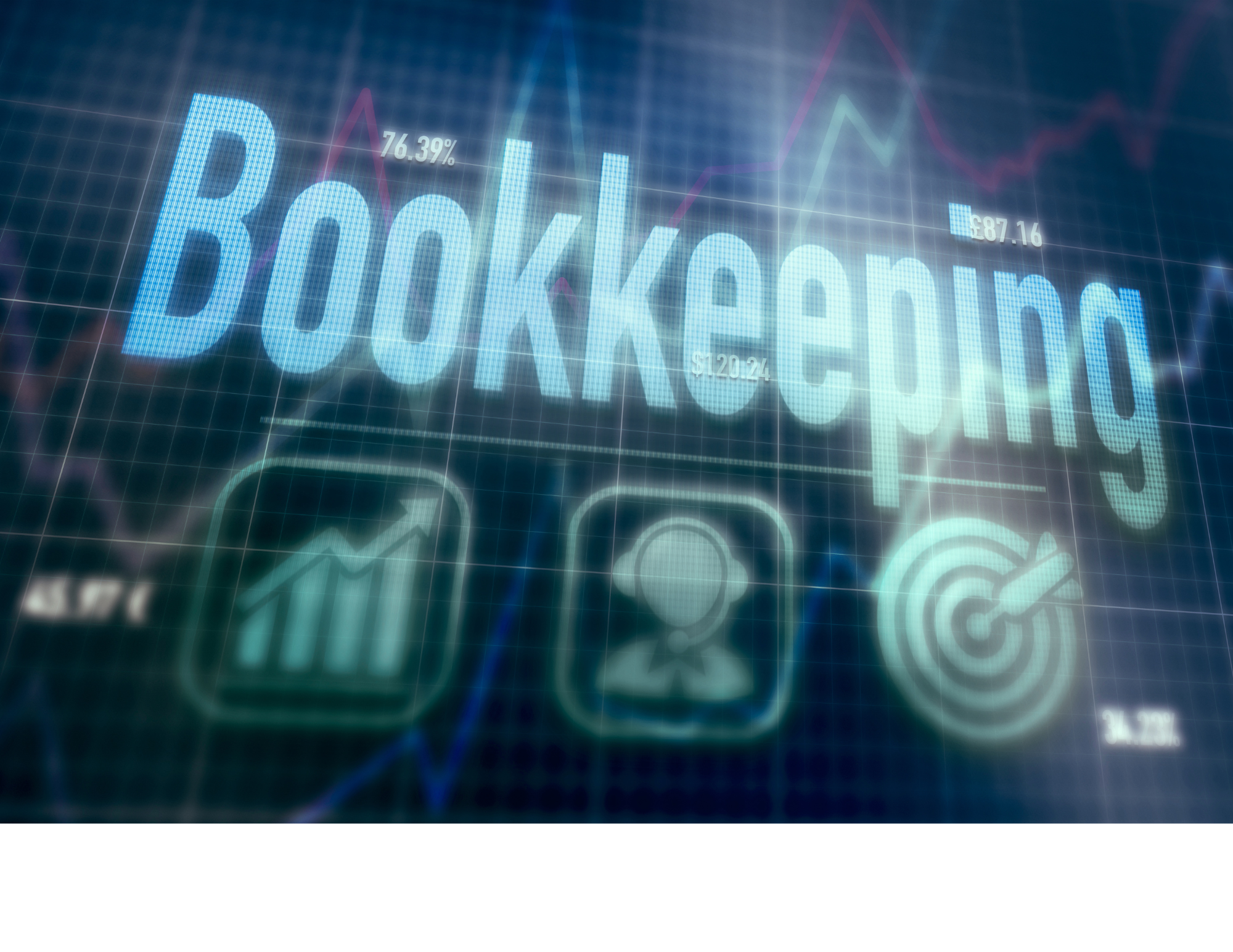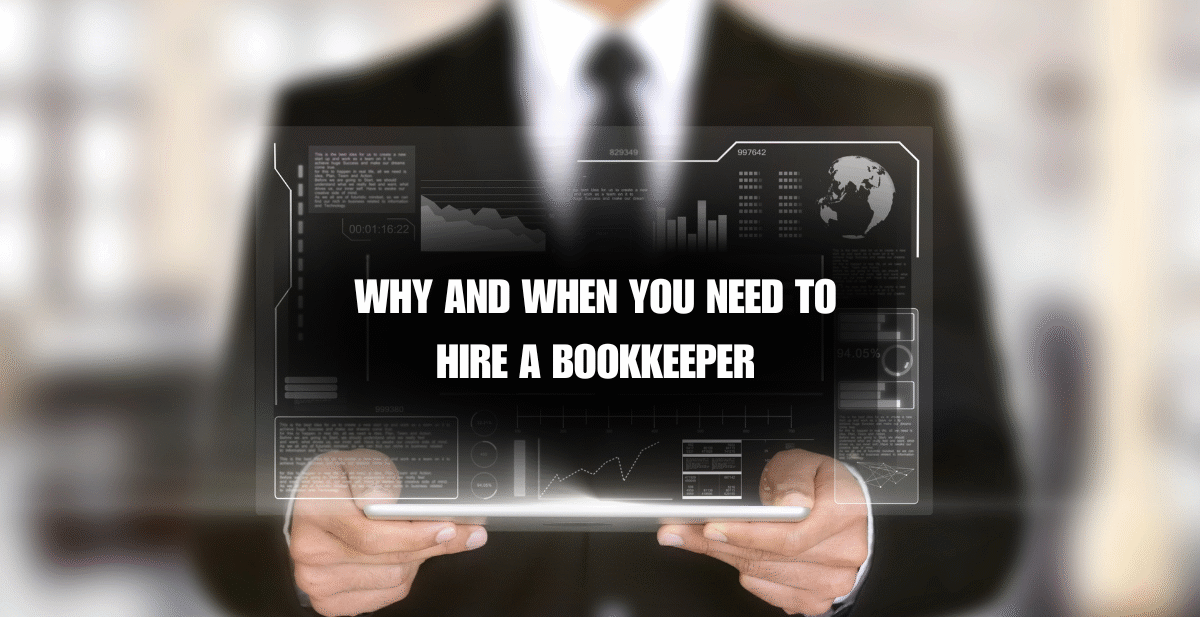Why and When You Need to Hire a Bookkeeper: A 2025 Guide to Financial Success
In the fast-paced business world of 2025, managing your company’s finances has become more critical—and complex—than ever before. As we approach the mid-2020s, the question of whether to hire a bookkeeper is no longer just about keeping your books in order; it’s about leveraging financial expertise to drive growth, ensure compliance, and make data-driven decisions. This comprehensive guide will explore why and when you should hire a bookkeeper, helping you navigate the evolving landscape of business finance.
Understanding the Role of a Bookkeeper

Before diving into the reasons for hiring a bookkeeper, it’s essential to understand what modern bookkeepers do and how they differ from accountants in 2025.
What Does a Bookkeeper Do?
Today’s bookkeepers are far more than number crunchers. They are financial data specialists who:
- Maintain daily financial records with precision
- Reconcile accounts using advanced AI-assisted tools
- Manage accounts payable and receivable with automated systems
- Prepare detailed financial statements that integrate with business intelligence platforms
- Offer insights on cash flow and financial health
According to a 2024 survey by the American Institute of Professional Bookkeepers (AIPB), 78% of bookkeepers now use AI-enhanced software to perform their duties, significantly increasing accuracy and efficiency.
Bookkeeper vs. Accountant: Key Differences
While bookkeepers and accountants both play crucial roles in financial management, their responsibilities differ:
| Aspect | Bookkeeper | Accountant |
|---|---|---|
| Focus | Day-to-day transactions | Financial strategy and analysis |
| Qualifications | Typically requires certification (e.g., CPB) | Often requires CPA or advanced degree |
| Scope | Recording financial transactions | Interpreting financial data, tax planning |
| Frequency | Ongoing, regular basis | Periodic (monthly, quarterly, annually) |
It’s worth noting that the lines between these roles have blurred somewhat in recent years. The Bureau of Labor Statistics reports that many bookkeepers are now taking on some traditional accounting tasks, especially in smaller businesses.
Signs It’s Time to Hire a Bookkeeper

Recognizing when your business needs a bookkeeper is crucial for sustainable growth. Here are some telltale signs that it’s time to bring in professional help:
Your Business is Growing Rapidly
If you’re experiencing a surge in revenue or expansion into new markets, it’s a clear indicator that professional bookkeeping is needed. In 2025, rapid growth often means:
- Increased transaction volume across multiple digital platforms
- More complex financial operations, including international transactions
- The need for real-time financial data to make quick, informed decisions
Case Study: In 2024, e-commerce startup GreenGrow saw its revenue triple in six months. By hiring a bookkeeper, they were able to streamline their financial processes, leading to a 15% reduction in operational costs and better inventory management.
You’re Spending Too Much Time on Finances
As a business owner, your time is valuable. If you find yourself spending hours each week on bookkeeping tasks, it’s time to consider hiring a professional. Consider this:
- The average small business owner spends 20 hours per month on bookkeeping (Source: Score.org)
- This time could be better spent on core business activities like product development, marketing, or customer relations
To calculate the opportunity cost of DIY bookkeeping, multiply the hours spent on bookkeeping by your hourly rate. If this number exceeds the cost of hiring a bookkeeper, it’s time to delegate.
Your Books Are Always Behind
In the digital age, having up-to-date financial information is not just convenient—it’s essential. Outdated books can lead to:
- Missed opportunities due to lack of current financial insights
- Difficulty in making timely business decisions
- Increased stress during tax season or when seeking funding
A professional bookkeeper ensures your financial data is always current, providing you with real-time insights into your business’s financial health.
You’re Missing Tax Deadlines or Making Errors
In 2025, tax regulations are more complex than ever, with frequent updates to accommodate the evolving digital economy. Missing deadlines or making errors can result in:
- Costly penalties and interest charges
- Increased risk of audits
- Damage to your business’s reputation
A study by the National Small Business Association found that 40% of small businesses spend over 80 hours per year dealing with federal taxes. A professional bookkeeper can significantly reduce this time and ensure compliance.
You Need Help with Cash Flow Management
Cash flow is the lifeblood of any business. If you’re struggling with:
- Unpredictable cash flow
- Difficulty in forecasting future financial needs
- Challenges in managing accounts receivable and payable
Then it’s time to consider hiring a bookkeeper. Modern bookkeepers use advanced forecasting tools to provide accurate cash flow projections, helping you make informed decisions about spending, investments, and growth opportunities.
Benefits of Hiring a Bookkeeper

Bringing a professional bookkeeper on board can transform your business’s financial management. Here are some key benefits:
Accurate and Up-to-Date Financial Records
In 2025, having precise, real-time financial data is non-negotiable. A professional bookkeeper ensures:
- All transactions are recorded accurately and promptly
- Financial statements are prepared regularly and correctly
- Your books are always audit-ready
Fact: According to a 2024 survey by Xero, businesses with up-to-date financial records are 23% more likely to achieve their growth targets.
Time and Cost Savings
By delegating bookkeeping tasks, you free up valuable time to focus on core business activities. Moreover:
- Professional bookkeepers work more efficiently, reducing the overall time spent on financial tasks
- Their expertise helps avoid costly errors that could lead to penalties or missed opportunities
- Many bookkeepers now use AI-powered tools that automate routine tasks, further increasing efficiency
Improved Financial Planning and Budgeting
With accurate, up-to-date financial records, you can:
- Create more realistic budgets based on actual financial data
- Perform scenario planning to prepare for various economic situations
- Make data-driven decisions about investments and growth strategies
Better Tax Compliance
In the complex tax landscape of 2025, staying compliant is more challenging than ever. A bookkeeper helps by:
- Keeping track of changing tax laws and regulations
- Ensuring all necessary documentation is in order for tax filings
- Identifying potential deductions and credits to minimize your tax burden
Scalability for Your Business
As your business grows, your financial needs become more complex. A professional bookkeeper can:
- Adapt your financial processes to accommodate growth
- Implement scalable systems that grow with your business
- Prepare your finances for investor scrutiny or potential sale
When to Hire a Bookkeeper: Key Milestones

While the need for a bookkeeper can arise at any time, certain business milestones often signal that it’s time to bring in professional help:
Starting a New Business
Even at the startup phase, professional bookkeeping can set you up for success by:
- Establishing proper financial systems from day one
- Helping you understand your startup costs and break-even point
- Setting up a chart of accounts tailored to your business
Reaching a Certain Revenue Threshold
While the exact number varies by industry, many businesses find they need professional bookkeeping services when they reach annual revenues of $200,000 to $500,000. At this point:
- The volume of transactions becomes too large to manage manually
- The complexity of financial operations increases
- The cost of professional services is more easily justified by the business’s income
Expanding to Multiple Locations or Product Lines
Expansion brings new financial challenges, including:
- Managing finances across different locations or departments
- Tracking performance of various product lines or services
- Dealing with potentially different tax jurisdictions
A bookkeeper can help navigate these complexities and provide insights to guide your expansion strategy.
Seeking Funding or Investors
When you’re looking to secure funding or attract investors, having impeccable financial records is crucial. A professional bookkeeper can:
- Prepare detailed financial statements required by potential investors
- Ensure your books can withstand the scrutiny of due diligence
- Help you create financial projections that instill confidence in lenders or investors
According to a 2024 report by CB Insights, startups with professional financial management are 30% more likely to secure funding.
Experiencing Rapid Growth or Seasonal Fluctuations
Businesses experiencing rapid growth or significant seasonal changes face unique financial challenges:
- Managing cash flow during growth spurts or slow seasons
- Scaling financial processes to handle increased transaction volumes
- Accurately forecasting financial needs based on growth trends or seasonal patterns
A skilled bookkeeper can help navigate these challenges, ensuring your financial management keeps pace with your business’s dynamics.
How to Choose the Right Bookkeeper for Your Business

Selecting the right bookkeeper is crucial for your business’s financial health. Here’s what to consider:
Qualifications and Certifications to Look For
In 2025, the most sought-after bookkeepers possess:
- Certified Public Bookkeeper (CPB) designation
- QuickBooks ProAdvisor certification (or equivalent for other popular accounting software)
- Familiarity with AI-enhanced accounting tools and blockchain technology
- Industry-specific certifications (e.g., restaurant or non-profit bookkeeping certifications)
Tip: Check with professional organizations like the American Institute of Professional Bookkeepers for up-to-date certification standards.
Full-Time vs. Part-Time vs. Outsourced: Pros and Cons
| Option | Pros | Cons |
|---|---|---|
| Full-Time | Deep understanding of your business, always available | Higher cost, may not be necessary for smaller businesses |
| Part-Time | Cost-effective, flexible | May not be available during crucial times |
| Outsourced | Access to a team of experts, scalable | Less personal connection, potential communication challenges |
Your choice depends on your business size, complexity, and budget. Many businesses in 2025 opt for a hybrid model, combining in-house and outsourced services for optimal flexibility.
Questions to Ask When Interviewing Bookkeepers
When vetting potential bookkeepers, consider asking:
- What experience do you have in my industry?
- Which accounting software platforms are you proficient in?
- How do you stay updated on changes in tax laws and accounting standards?
- Can you provide references from clients similar to my business?
- How do you handle data security and confidentiality?
- What is your approach to using AI and automation in bookkeeping?
Red Flags to Watch Out For
Be cautious of bookkeepers who:
- Lack verifiable references or are hesitant to provide them
- Use outdated methods or resist adopting new technologies
- Cannot clearly explain their processes or fees
- Show signs of poor communication or unprofessionalism
Remember, your bookkeeper will have access to sensitive financial information, so trust and professionalism are paramount.
Common Fears and Hesitations About Hiring a Bookkeeper

Many business owners hesitate to hire a bookkeeper due to various concerns. Let’s address some common fears:
Cost Concerns
While hiring a bookkeeper is an investment, it often leads to cost savings in the long run:
- Reduced errors and penalties save money on taxes and fines
- Improved financial management can lead to better business decisions and increased profitability
- Time saved on bookkeeping tasks can be redirected to revenue-generating activities
A 2024 study by Sage found that businesses using professional bookkeeping services reported an average of 20% improvement in profitability over three years.
Privacy and Trust Issues
Sharing financial information can feel risky. To mitigate these concerns:
- Choose a bookkeeper with strong references and a proven track record
- Ensure they use secure, encrypted systems for data storage and transfer
- Establish clear confidentiality agreements
- Regularly review financial reports and ask questions to stay informed
Loss of Control
Some business owners worry about losing control over their finances. However, a good bookkeeper should:
- Provide regular, detailed reports to keep you informed
- Involve you in major financial decisions
- Empower you with better financial insights, actually giving you more control
To maintain oversight:
- Set up a system of checks and balances
- Schedule regular meetings to review financial status
- Use cloud-based accounting software that allows you to access financial data anytime
Preparing Your Business for a Bookkeeper

Once you’ve decided to hire a bookkeeper, proper preparation can ensure a smooth transition:
Organizing Your Current Financial Records
Before bringing in a bookkeeper:
- Gather all financial documents (bank statements, receipts, invoices, etc.)
- Organize documents by type and date
- Create a list of all financial accounts and their purposes
- Document any outstanding financial issues or concerns
Tip: Consider using a document management system like Dropbox Business or Google Drive for Work to digitize and organize your financial records.
Setting Clear Expectations and Goals
To ensure a successful partnership with your bookkeeper:
- Define specific roles and responsibilities
- Establish key performance indicators (KPIs) for financial management
- Set clear communication protocols and reporting schedules
- Discuss your business goals and how the bookkeeper can support them
Create a written agreement that outlines these expectations to avoid misunderstandings.
Choosing and Implementing Accounting Software
In 2025, the right accounting software is crucial for efficient bookkeeping. Consider:
- Cloud-based solutions for real-time access and collaboration
- AI-enhanced features for automation and insights
- Integration capabilities with other business systems (e.g., CRM, inventory management)
Popular options include:
Work with your bookkeeper to choose and implement the best solution for your business needs.
The Cost of Hiring a Bookkeeper

Understanding the costs associated with hiring a bookkeeper can help you budget effectively:
Average Rates for Bookkeeping Services
As of 2025, bookkeeping rates vary based on several factors:
| Service Type | Average Cost Range |
|---|---|
| Hourly Rate | $30 – $90 per hour |
| Monthly Fee (Small Business) | $300 – $2,000 per month |
| Project-Based | $500 – $5,000+ depending on scope |
Note: These are general ranges. Actual costs may vary based on location, industry, and complexity of your financial needs.
Hidden Costs to Consider
When budgeting for bookkeeping services, don’t forget to account for:
- Software and technology expenses (e.g., accounting software subscriptions)
- Training and onboarding time
- Potential upgrades to your financial systems
- Additional services like tax preparation or financial analysis
Comparing In-House vs. Outsourced Bookkeeping Costs
Consider the long-term financial implications of each option:
In-House Bookkeeper:
- Salary + benefits (average annual cost: $45,000 – $60,000 for full-time)
- Training and professional development expenses
- Office space and equipment costs
Outsourced Bookkeeping:
- Service fees (typically lower than full-time salary)
- No additional overhead costs
- Scalable services as your business grows
Many businesses find that outsourced bookkeeping provides a more cost-effective solution, especially when considering the expertise and scalability offered.
How a Bookkeeper Can Save You Money

While hiring a bookkeeper is an expense, it often leads to significant cost savings:
Identifying and Reducing Unnecessary Expenses
A skilled bookkeeper can:
- Conduct regular financial reviews to spot inefficiencies
- Analyze spending patterns to identify areas for cost-cutting
- Negotiate better terms with vendors based on financial data
Case Study: In 2024, a mid-sized manufacturing company hired a bookkeeper who identified $50,000 in unnecessary annual expenses through detailed financial analysis, resulting in a 5% increase in profit margin.
Maximizing Tax Deductions and Credits
Bookkeepers stay updated on tax laws and can help you:
- Keep detailed records of all potential deductions
- Identify industry-specific tax credits you may be eligible for
- Ensure you’re taking advantage of all available tax benefits
According to a 2024 survey by TaxFoundation.org, businesses that use professional bookkeeping services claim an average of 20% more deductions than those that don’t.
Preventing Costly Financial Mistakes
Professional bookkeepers can help avoid:
- Late payment fees and interest charges
- Penalties for tax filing errors or missed deadlines
- Overpayment of bills or duplicate payments
These small savings can add up to significant amounts over time. A study by the American Institute of CPAs found that businesses with professional bookkeepers reduce financial errors by up to 70%.
Improving Cash Flow Management
Effective cash flow management is crucial for business success. A bookkeeper can:
- Implement efficient invoicing systems to speed up payments
- Optimize payment schedules to vendors
- Provide accurate cash flow forecasts for better decision-making
Tip: Many bookkeepers now use AI-powered tools like Float or Fluidly for advanced cash flow forecasting and management.
Bookkeeping for Specific Industries

Different industries have unique bookkeeping needs. Here’s how bookkeepers can add value in various sectors:
Retail and E-commerce
For retail businesses, bookkeepers can:
- Manage complex inventory accounting
- Reconcile sales across multiple channels (in-store, online, mobile)
- Handle sales tax calculations for different jurisdictions
E-commerce platforms like Shopify often integrate with accounting software, streamlining the bookkeeping process.
Service-Based Businesses
In service industries, bookkeepers focus on:
- Tracking billable hours and project costs
- Managing retainers and recurring billing
- Analyzing profitability by client or service type
Tools like Harvest can be integrated with accounting software to simplify time tracking and invoicing.
Restaurants and Hospitality
Bookkeepers in this sector specialize in:
- Tracking food and beverage costs
- Managing complex payroll systems including tips
- Analyzing profit margins by menu item
Restaurant-specific software like Toast can be integrated with accounting systems for comprehensive financial management.
Construction and Contracting
For construction businesses, bookkeepers handle:
- Job costing and project accounting
- Managing subcontractor payments and compliance
- Tracking equipment depreciation and maintenance costs
Software like Procore can be linked with accounting systems to provide detailed project financial tracking.
Non-Profit Organizations
Non-profit bookkeepers specialize in:
- Tracking and reporting on grants and donations
- Ensuring compliance with specific reporting requirements
- Managing restricted and unrestricted funds
Non-profit-specific accounting software like Aplos can help manage the unique financial needs of these organizations.
Technology and Bookkeeping: Embracing the Digital Age

In 2025, technology plays a crucial role in bookkeeping. Here are some key technological advancements:
Cloud-Based Accounting Software
Cloud-based solutions offer numerous benefits:
- Real-time access to financial data from anywhere
- Automatic backups and updates
- Easy collaboration between business owners, bookkeepers, and accountants
Popular cloud accounting platforms include:
Automation in Bookkeeping
AI and machine learning are revolutionizing bookkeeping tasks:
- Automated data entry using OCR (Optical Character Recognition) technology
- AI-powered categorization of transactions
- Automated bank reconciliation
Tools like Receipt Bank and Hubdoc use AI to streamline data entry and document management.
Integrating Bookkeeping with Other Business Systems
Modern bookkeeping systems can integrate with various business tools, creating a seamless flow of financial data:
- Point-of-sale (POS) systems for retail businesses
- Customer Relationship Management (CRM) software
- Inventory management systems
- Payroll and HR platforms
For example, Square POS systems can integrate directly with accounting software, automatically syncing sales data and simplifying reconciliation.
The Future of Bookkeeping: Trends to Watch

As we look towards the latter half of the 2020s, several trends are shaping the future of bookkeeping:
Blockchain and Cryptocurrency Accounting
With the increasing adoption of cryptocurrencies and blockchain technology, bookkeepers need to be prepared for:
- Recording and tracking cryptocurrency transactions
- Understanding the tax implications of crypto assets
- Implementing blockchain-based accounting systems for enhanced security and transparency
Cryptio is an example of a platform designed to help businesses manage crypto assets and integrate them into traditional accounting systems.
Data Analytics and Financial Forecasting
Advanced data analytics are becoming integral to bookkeeping:
- Predictive analytics for more accurate financial forecasting
- Big data analysis for identifying business trends and opportunities
- Real-time financial dashboards for instant insights
Tools like Fathom are pioneering the use of advanced analytics in small business financial management.
Continuous Accounting
The traditional model of month-end closes is giving way to continuous accounting:
- Real-time recording and reconciliation of transactions
- Ongoing financial reporting and analysis
- Shift from periodic to continuous auditing
This approach, facilitated by AI and automation, allows for more timely and accurate financial insights.
Case Studies: Businesses That Benefited from Hiring a Bookkeeper

Let’s look at some real-world examples of how hiring a bookkeeper has transformed businesses:
Small E-commerce Startup: GreenGrow
Challenge: Rapid growth led to overwhelming financial management tasks.
Solution: Hired a part-time bookkeeper specializing in e-commerce.
Results:
- 15% reduction in operational costs through better inventory management
- Improved cash flow forecasting led to 20% increase in available working capital
- Streamlined integration between Shopify and QuickBooks Online
Growing Service-Based Business: TechSolve IT Consultancy
Challenge: Difficulty tracking billable hours and managing complex client billing.
Solution: Engaged a full-time bookkeeper with expertise in service-based businesses.
Results:
- 30% increase in billable hours captured
- Reduced time to invoice by 50%
- Improved profitability analysis led to 25% increase in high-margin services
Established Manufacturing Company: MetalWorks Inc.
Challenge: Outdated financial processes hindering growth and decision-making.
Solution: Hired an experienced bookkeeper to modernize financial systems.
Results:
- Implemented job costing system, revealing 15% of projects were unprofitable
- Reduced accounts receivable days by 20% through improved invoicing processes
- Provided data-driven insights leading to 10% increase in overall profitability
These case studies demonstrate the tangible benefits of professional bookkeeping across various industries and business sizes.
DIY Bookkeeping vs. Professional Services: An Honest Comparison

While DIY bookkeeping might seem cost-effective, it’s important to weigh the pros and cons:
Pros and Cons of DIY Bookkeeping
Pros:
- Cost savings on professional fees
- Direct control over financial processes
- Intimate knowledge of business finances
Cons:
- Time-consuming, taking focus away from core business activities
- Higher risk of errors and compliance issues
- Lack of expert insights for financial decision-making
When DIY Bookkeeping Makes Sense
DIY bookkeeping might be suitable for:
- Very small or new businesses with simple finances
- Businesses with owners who have strong financial backgrounds
- Situations where transaction volume is low (less than 100 per month)
Signs It’s Time to Switch from DIY to Professional
Consider professional bookkeeping when:
- Your business is growing rapidly
- You’re spending more than 10 hours a month on bookkeeping tasks
- You’re unsure about tax compliance or financial regulations
- You need more sophisticated financial analysis for decision-making
- You’re seeking funding or preparing for an audit
According to a 2024 survey by SCORE, 40% of small business owners who switched from DIY to professional bookkeeping reported significant improvements in their financial management and decision-making processes.
How to Work Effectively with Your Bookkeeper

To maximize the benefits of professional bookkeeping, it’s crucial to establish a productive working relationship:
Establishing Clear Communication Channels
- Set up regular check-ins (weekly or monthly, depending on your needs)
- Use collaborative tools like Slack or Microsoft Teams for quick questions and updates
- Establish a clear reporting schedule and format
Tip: Many modern accounting platforms like QuickBooks Online and Xero offer built-in communication tools to facilitate collaboration between business owners and bookkeepers.
Providing Necessary Information and Access
To ensure your bookkeeper can work efficiently:
- Grant appropriate access to financial accounts and systems
- Set up a secure method for sharing sensitive documents (e.g., Box or Dropbox Business)
- Provide context for unusual transactions or business decisions that may impact finances
Setting Boundaries and Expectations
Clear boundaries help maintain a professional relationship:
- Define roles and responsibilities in writing
- Establish working hours and response times
- Agree on the scope of services and additional fees for work outside this scope
Legal and Ethical Considerations in Bookkeeping

In 2025, with increasing digital transactions and data privacy concerns, legal and ethical considerations in bookkeeping are more important than ever:
Confidentiality and Data Protection
Bookkeepers must adhere to strict data protection standards:
- Use encrypted, secure systems for storing financial data
- Comply with data protection regulations like GDPR or CCPA
- Implement strong access controls and authentication measures
The American Institute of Professional Bookkeepers (AIPB) provides guidelines on maintaining client confidentiality in the digital age.
Ethical Standards for Bookkeepers
Professional bookkeepers should adhere to a code of ethics, including:
- Maintaining integrity and objectivity in all professional relationships
- Continuously updating their knowledge and skills
- Avoiding conflicts of interest
The National Association of Certified Public Bookkeepers (NACPB) offers a comprehensive code of professional conduct for bookkeepers.
Your Legal Responsibilities as a Business Owner
As a business owner, you have legal obligations regarding financial record-keeping:
- Maintain accurate and complete financial records
- Retain financial documents for the required period (usually 3-7 years, depending on the document type)
- Ensure timely filing of tax returns and other financial reports
Consult with a legal professional or visit the IRS website for specific requirements in your industry and location.
Conclusion: Making the Decision to Hire a Bookkeeper

As we’ve explored throughout this guide, hiring a bookkeeper can be a game-changing decision for your business. In 2025, with the increasing complexity of financial management and the rapid pace of technological change, professional bookkeeping services are more valuable than ever.
Key takeaways:
- Recognize the signs: If you’re spending too much time on finances, falling behind on bookkeeping tasks, or need more sophisticated financial insights, it’s time to consider hiring a bookkeeper.
- Understand the benefits: Professional bookkeepers can save you time, reduce errors, improve financial planning, and ultimately contribute to your business’s growth and profitability.
- Choose wisely: Look for a bookkeeper with relevant qualifications, industry experience, and a good understanding of modern bookkeeping technologies.
- Prepare for success: Organize your financial records, set clear expectations, and choose the right accounting software to make the transition smooth.
- Embrace technology: Take advantage of cloud-based accounting, automation, and data analytics to enhance your financial management processes.
- Consider the long-term impact: While there’s an upfront cost, the long-term benefits of professional bookkeeping often far outweigh the investment.
- Stay involved: Even with a professional bookkeeper, maintain oversight of your finances and use the insights provided to make informed business decisions.
As you contemplate this decision, remember that every business is unique. What works for one company may not be the best solution for another. Take the time to assess your specific needs, consult with financial professionals, and consider how a bookkeeper could fit into your overall business strategy.
Next Steps
If you’re considering hiring a bookkeeper, here are some actionable steps to take:
- Assess your current financial management processes: Identify pain points and areas where professional help could make a significant difference.
- Calculate the potential ROI: Estimate the time and money you could save by outsourcing bookkeeping tasks.
- Research potential bookkeepers: Look for professionals or firms with experience in your industry. Check references and read reviews.
- Schedule consultations: Many bookkeepers offer initial consultations. Use these to discuss your needs and see if there’s a good fit.
- Review your technology: Assess whether your current accounting software is adequate or if you need to upgrade to support professional bookkeeping services.
- Prepare your team: If you have employees who currently handle financial tasks, involve them in the transition process.
- Start small if needed: Consider starting with part-time or project-based bookkeeping services before committing to a full-time solution.
Remember, the goal of hiring a bookkeeper is not just to maintain accurate financial records, but to gain a partner in your business’s financial health and growth. With the right bookkeeper, you can free up your time to focus on what you do best – running and growing your business.
As we move further into the digital age, the role of bookkeepers continues to evolve. They’re no longer just number crunchers, but strategic partners who can provide valuable insights and help drive your business forward. By understanding when and why to hire a bookkeeper, you’re taking an important step towards more robust financial management and, ultimately, greater business success.
For more information on bookkeeping best practices and industry standards, visit the American Institute of Professional Bookkeepers (AIPB) or the National Association of Certified Public Bookkeepers (NACPB). These organizations offer valuable resources for both business owners and bookkeeping professionals.
In conclusion, as we navigate the complex business landscape of 2025, professional bookkeeping is not just a luxury for large corporations – it’s a vital tool for businesses of all sizes looking to thrive in an increasingly competitive and regulated environment. By making informed decisions about your financial management, including when to bring in professional help, you’re setting your business up for long-term success and growth.
Frequently Asked Questions About Hiring a Bookkeeper

To further assist you in your decision-making process, here are answers to some commonly asked questions about hiring a bookkeeper:
Q1: How much does it cost to hire a bookkeeper?
A: The cost of hiring a bookkeeper can vary widely depending on factors such as:
- Your business size and complexity
- The scope of services required
- Whether you’re hiring full-time, part-time, or outsourcing
As of 2025, typical costs range from:
- $30-$90 per hour for freelance or contract bookkeepers
- $3,000-$5,000 per month for full-service bookkeeping firms
- $40,000-$60,000 annual salary for a full-time, in-house bookkeeper
Remember, while cost is an important factor, it’s crucial to consider the value and potential return on investment that professional bookkeeping can provide.
Q2: Can’t I just use accounting software instead of hiring a bookkeeper?
A: While modern accounting software like QuickBooks or Xero can handle many basic bookkeeping tasks, they are tools that still require human oversight and expertise to be used effectively. A professional bookkeeper can:
- Ensure the software is set up correctly for your business
- Interpret the data and provide valuable insights
- Handle complex financial situations that software alone can’t manage
- Stay up-to-date with tax laws and regulations
In many cases, the best solution is a combination of robust accounting software and professional bookkeeping services.
Q3: What’s the difference between a bookkeeper and an accountant?
A: While there’s some overlap in their roles, bookkeepers and accountants typically have different focuses:
| Bookkeeper | Accountant |
|---|---|
| Focuses on day-to-day financial transactions | Provides higher-level financial strategy and analysis |
| Records and categorizes financial transactions | Prepares and analyzes financial statements |
| Manages accounts payable and receivable | Handles tax planning and preparation |
| Typically doesn’t require a specific degree | Often has a degree in accounting or finance |
Many businesses benefit from having both a bookkeeper for regular financial management and an accountant for periodic review and strategic planning.
Q4: How do I know if my bookkeeper is doing a good job?
A: Some indicators of a good bookkeeper include:
- Your financial records are always up-to-date and accurate
- They provide regular, easy-to-understand financial reports
- They’re proactive in suggesting ways to improve your financial processes
- They’re able to answer your financial questions clearly
- Your tax filings and other compliance requirements are always met on time
- You have a clear understanding of your business’s financial health
Consider setting key performance indicators (KPIs) with your bookkeeper to measure their effectiveness.
Q5: Is it safe to give a bookkeeper access to my financial information?
A: While it’s natural to have concerns about sharing sensitive financial information, professional bookkeepers are bound by strict ethical standards and confidentiality agreements. To ensure safety:
- Choose a bookkeeper with good references and credentials
- Use secure, encrypted methods for sharing financial data
- Implement proper access controls on your financial systems
- Have a clear agreement about data handling and confidentiality
Reputable bookkeepers will prioritize the security and confidentiality of your financial information.
Q6: How often should I meet with my bookkeeper?
A: The frequency of meetings can vary based on your business needs, but generally:
- Weekly or bi-weekly meetings are common for businesses with high transaction volumes or complex finances
- Monthly meetings work well for many small to medium-sized businesses
- Quarterly reviews might be sufficient for very small businesses with simple finances
Regular communication, even if brief, helps ensure you stay informed about your financial situation and can address any issues promptly.
Q7: Can a bookkeeper help me with business strategy?
A: While business strategy isn’t typically a bookkeeper’s primary role, a good bookkeeper can provide valuable input for strategic decisions by:
- Offering insights into your financial trends and patterns
- Providing accurate financial data to inform your strategy
- Helping you understand the financial implications of different strategic options
- Assisting with budgeting and forecasting for strategic initiatives
Remember, while bookkeepers can provide financial insights to support strategy, major strategic decisions should involve input from various sources, including business advisors or consultants specializing in strategy.
Q8: What software skills should I look for in a bookkeeper?
A: In 2025, a competent bookkeeper should be proficient in:
- Cloud-based accounting software (e.g., QuickBooks Online, Xero, Sage)
- Data analysis tools (e.g., Microsoft Excel, Google Sheets)
- Document management systems (e.g., Hubdoc, Receipt Bank)
- Payroll software relevant to your business
- Basic understanding of AI and machine learning applications in finance
Additionally, familiarity with industry-specific software can be a plus.
Q9: How can a bookkeeper help me prepare for tax season?
A: A bookkeeper can be invaluable during tax season by:
- Ensuring all financial records are accurate and up-to-date
- Organizing and categorizing expenses for maximum deductions
- Preparing necessary financial statements
- Gathering required documentation for your tax preparer
- Identifying potential tax-saving opportunities throughout the year
This preparation can make tax filing smoother and potentially reduce your tax liability.
Q10: Can a bookkeeper help me if I’m behind on my books?
A: Yes, many bookkeepers offer catch-up or clean-up services. They can:
- Organize and enter backlogged transactions
- Reconcile accounts
- Prepare overdue financial statements
- Help get you back on track with tax filings and other compliance requirements
While it may take some time and effort, getting your books up-to-date is crucial for making informed business decisions and meeting legal obligations.
Conclusion
Hiring a bookkeeper is a significant decision that can have a profound impact on your business’s financial health and overall success. As we’ve explored throughout this comprehensive guide, professional bookkeeping services offer numerous benefits, from time savings and improved accuracy to valuable financial insights and better compliance.
In the dynamic business environment of 2025, where financial regulations are complex and technology is rapidly evolving, having a skilled bookkeeper on your team can be a key differentiator. They can help you navigate challenges, seize opportunities, and make data-driven decisions to drive your business forward.
Remember, the right time to hire a bookkeeper varies for each business. Consider your current financial management processes, the complexity of your finances, your growth plans, and the value you place on expert financial guidance. If you find yourself spending too much time on bookkeeping tasks, falling behind on financial records, or needing more sophisticated financial analysis, it may be time to bring in a professional.
As you move forward, whether you decide to hire a bookkeeper now or in the future, keep in mind that financial management is an ongoing process. Regularly assess your needs, stay informed about financial best practices, and be open to adapting your approach as your business evolves.
By prioritizing accurate and insightful financial management, you’re laying a strong foundation for your business’s long-term success and growth. Whether you’re a small startup or an established enterprise, the right bookkeeping support can be a valuable asset in achieving your business goals.



